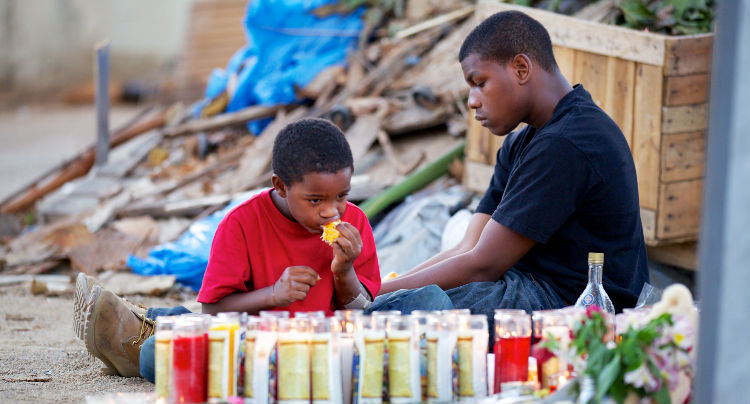
A movie not about hood life so much as it is about the spirit of those who dream of overcoming it.

A movie not about hood life so much as it is about the spirit of those who dream of overcoming it.
“I got to get a job to pay child support, but to get a job I have to have a driver’s license. And to get a driver’s license, I still need to pay child support.” So says Bambi, the hero of filmmaker Malik Vitthal’s touching street tale Imperial Dreams. He’s explaining to a DMV worker the absurdity of his current, impossible dilemma passed down to him by bureaucrats in a big building far, far away. Played by Attack the Block‘s John Boyega, Bambi’s spent over two years in jail and just been released to find his young son, Day, growing up virtually unsupervised in the slums of Los Angeles. While in prison, he discovered a passion for creative writing and plans to use pencil and paper to get he and his son out of the hood and on to a brighter future. There’s been some progress–one of his short stories got published in a magazine–but with his past so deeply-rooted in gangland, chances of escape are slim and none.
Director Mark Vitthal’s feature debut has been making noise on the festival circuit since Sundance, and there’s merit to the excitement. The story of a reformed former thug fighting to escape the gangster life is an American staple, revisited frequently in recent years on the indie scene, but Vitthal and co-writer Ismet Mrcic’s riff is an elegant one, as is their version of the inner-city milieu. The film is strikingly tender, with Bambi’s love and devotion for his son (and to a lesser extent, his art) informing every scene. Bambi’s toughness is never in question, but as an anti-hero, he’s of the gentler variety.

The most imminent threat to Bambi’s dream of a clean future is his thug uncle Shrimp (Glenn Plummer), who Day’s been under the care of while Bambi was in prison. Upon Bambi’s release, Shrimp provides he and Day with food and a place to live, but with a catch: If Bambi wants to stay under his uncle’s roof, he’s going to have to do jobs for him again, returning to the gangster life that bought him a ticket to prison in the first place. This, along with his child support woes and Day’s mother (Keke Palmer) being locked up herself, puts Bambi smack dab in the middle of an inescapable living nightmare.
He’s willing to fight for his future, though. He doesn’t succumb to Shrimp’s offers of gangster relapse, leaving with Day and living out of his ratty car parked in a project parking lot. He keeps hope alive with his writing, candid confessions of his trails on the street we see him recite to his son under the christmas lights he’s lined the inside of their car-home with. Boyega is terrific in these father-son moments; he’ll fill your heart and then break it. These are desperate times for Bambi, and Boyega conveys the urgency of his situation with every movement, his face a window to his internal struggle.
Vitthal’s portrayal of criminal life is respectful, with no characters being over-simplified or stereotyped. Yes, there are gunfights and nighttime alleyway foot chases, but more than any other gang movie in recent memory, Imperial Dreams sidesteps cliches and carves out a place of its own next to the best films in the genre. Vitthal’s imagery is dreamlike, which is perfectly appropriate; this isn’t a film about hood life so much as it is about the spirit of those who dream of overcoming it.